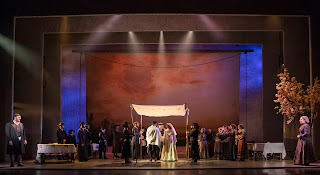The 1964 musical Fiddler on the Roof is based on late 19th century stories by Russian Jewish writer Sholem Aleichem. Tevye is a poor and simple man with strong belief in his Jewish faith and traditions. He believes in doing things the way they've always been done, which means arranging marriages for his five daughters. But it's 1905, and the times, they are a-changin'. Oldest daughter Tzeitel wants to marry a man of her choice, a poor tailor. Despite the fact that Tevye has arranged for her to marry the wealthy (and much older) butcher, he gives in to Tzeitel. It's obvious that the girls have their papa wrapped around their little fingers and he would do (almost) anything to see them happy. In the struggle between tradition and his daughters' happiness, his daughters win. Second daughter Hodel moves further away from family tradition when she agrees to marry a man not from the village, a scholar and political activist who gets arrested and sent to Siberia, with Hodel to follow. Third daughter Chava goes a step too far when she wants to marry outside the faith, a Russian man named Fyedka (but he's one of the "good" Russians). It breaks Tevye's heart to do so, but he cannot accept this gross breach of tradition and the seeming rejection of the faith he holds so dear. But these are not the only problems poor Tevye is dealing with; 1905 Russia was not a welcoming place for Jews. Facing religious persecution and pogroms, Tevye and his family are forced to leave and find a new home. It's a sad ending, but there's also a feeling of hope that this family will stay together and continue their traditions, as well as begin new traditions, wherever they find themselves.*
 |
| Yehezkel Lazarov as Tevye (photo by Joan Marcus) |
 |
| the wedding scene (photo by Joan Marcus) |
The world of Anatevka is represented in sepia tones in the sparse yet efficient set. Backdrops of the family home, village, or local drinking establishment lower from the ceiling, with set pieces rolled on and off stage as needed. The cast are dressed in muted traditional period clothing that feels, again, authentic, except for the Fiddler, dressed in brilliant purple, appearing as if like a spirit (embodied by Ali Arian Molaei). And the dream sequence gets pretty wild with oversized masks and stilts. (Set design by Michael Yeargan, costume design by Catherine Zuber.)
Even though this show is three hours, it never feels too long and moves at good pace, never dragging, under the guidance of renowned Broadway director by Bartlett Sher. This new production adds in a brief framing device, in which the actor playing Tevye walks on stage wearing a modern hooded jacket, reading from a book. He soon removes the jacket and becomes Tevye, becomes the story he was reading. At the end of the show, he dons the jacket again and gets back in line with his community forcibly leaving their home, with his hand on the Fiddler's shoulder, as if to say that this march, this searching for a home, this persecution, this struggle with holding on to traditions, faith, and family continues today. And unfortunately it does, for the global Jewish community as anti-Semitism has risen in recent years, and for other communities who have been forced to leave their homes due to war, violence, or poverty and go in search of a better life. Fiddler on the Roof honors those who persevere, time and again, on this never-ending journey to home.
Fiddler on the Roof continues at the Ordway Center for the Performing Arts through December 12.
*Plot summary borrowed from what I wrote about previous productions.

